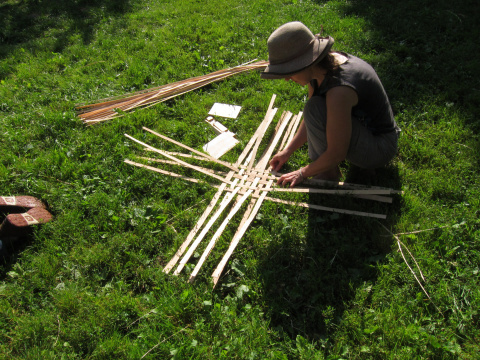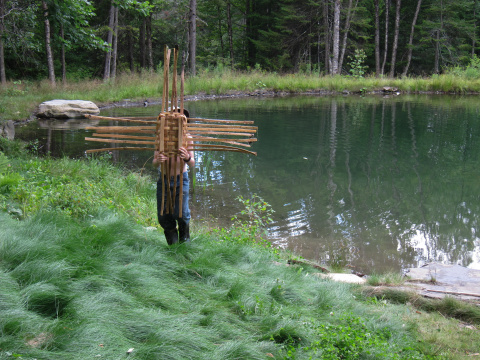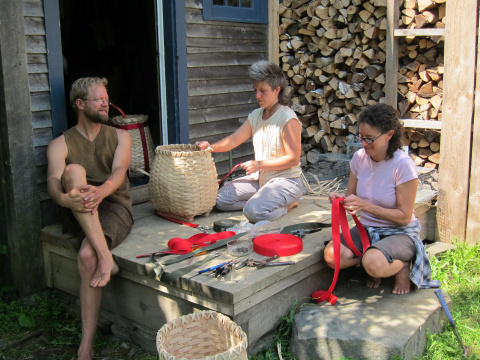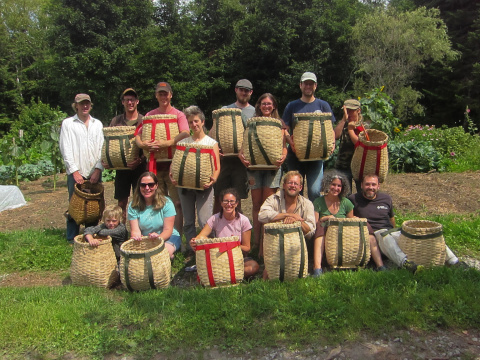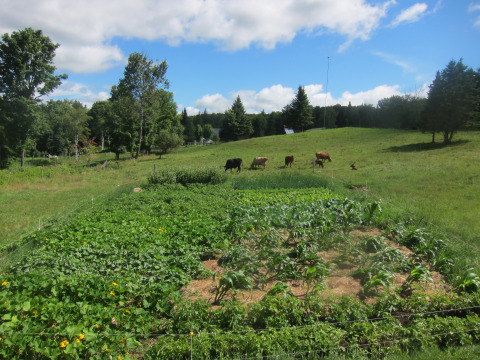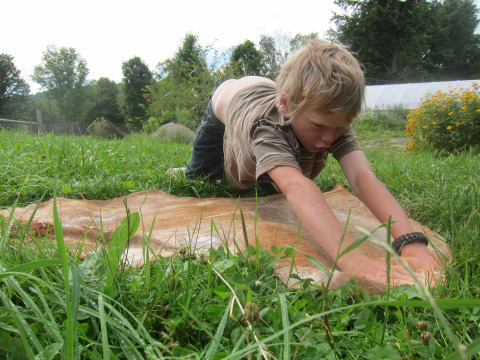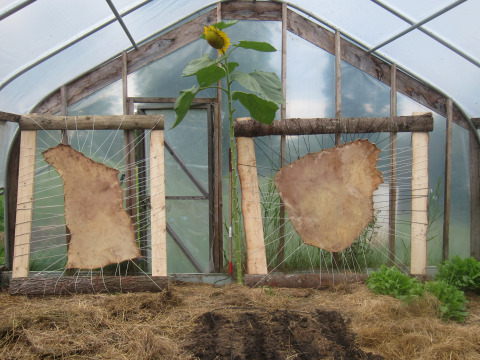Ben Hewitt's Blog, page 46
August 12, 2014
I Wrote A Little Story
It begins like this:
On a recent morning in early September, in a wood clapboarded house situated on a 40-acre farm just outside a small town in northern Vermont, two boys awaken. They are brothers; the older is 12 and the younger is 9, and they arise to a day that has barely emerged from the clutches of dark. It is not yet autumn, but already the air has begun to change, the soft nights of summer lengthening and chilling into the season to come. Outside the boys’ bedroom window, the grass is dew-bent and lush, the leaves on the maples just starting to turn.
School is back in session and has been for two weeks or more, but the boys are unhurried. They dress slowly, quietly: Faded and frayed thrift store camo pants. Flannel shirts. Rubber barn boots. Around their waists, leather belts affixed with knife sheaths. In each sheath, a fixed blade knife.
By 6:30, with the first rays of sun burning through the dense, ground level fog, the boys are outside. At some point in the next hour or so, a long yellow school bus will rumble past the end of the driveway that connects the farm to the town road. The bus will be full of children the boys’ age, their foreheads pressed against the window glass, gazing at the unfurling landscape, the fields and hills and forests of the small working class community they call home.
The boys will pay the bus no heed. This could be because they will be seated at the kitchen table, eating breakfast with their parents. Or it might be because they are already deep in the woods below the house, where a prolific brook trout stream sluices through a stand of balsam fir; there is an old stone bridge abutment at the stream’s edge, and the boys enjoy standing atop it, dangling fresh-dug worms into the water below. Perhaps they won’t notice the bus because they are already immersed in some project or another: Tillering a long bow of beech or black locust, or starting a fire over which to cook the quartet of brookies they’ve carried back from the stream. They heat a flat rock at the fire’s edge and the hot stone turns the fishes’ flesh milky white and flaky.
Or here’s an alternate theory: Maybe the boys will pay the bus no heed because it’s passing is meaningless to them. Maybe they have never ridden in a school bus, and maybe this is because they have never been to school. Perhaps they have not passed even a single day of their short childhoods inside the four walls of a classroom, their gaze shifting between window and clock, window and clock, counting the restless minutes and interminable hours until release.
Maybe the boys in question are actually my sons, and maybe their names are Finlay and Rye, and maybe, if my wife Penny and I get our way, they will never go to school.
Hey, a father can dream, can’t he?
You can read the rest of it here.

Fermentation: It Rots!
Finally, the oft-requested (sounds a lot better than “occasionally” requested, which is closer to the truth) kimchi recipe.
Coupla notes: We never follow this to the letter. Part of the fun of fermenting is playing with it a bit. If we don’t have an ingredient, we don’t put it in – with the exceptions of cabbage, salt, and water, any of the following can be omitted. Second, we like relatively chunky kimchi, so we hand chop pretty much everything, though we’re prone to getting lazy and putting the garlic and ginger in the processor. Or we freeze the ginger and grate it. That works real swell. Third, you should wash of any obvious dirt, but don’t go scrubbing like crazy. You want the good, naturally occurring bacteria on your veggies (esp your cabbage) to stay put. And never, ever use any chlorinated water!!! The chlorine inhibits bacterial activity. Although, truth is, you shouldn’t need to add much, if any, additional water. The moisture in the cell walls of your vegetables should be adequate.
Finally, in terms of storage, we leave packed jars at room temp (leave the lids slightly loose and put a towel under the jars, ’cause they need to bubble a bit and release some pressure, or you risk explosions) for three or four days. Then we transfer to the root cellar, which runs 40-50 degrees depending on time of year. We have very little spoilage loss under these conditions; maybe a jar or two out of 50 or 60. Sometimes, none. We’ve eaten three-year old kimchi out of our root cellar with no adverse affects. It was a little soft, but not bad.
Fermentation: It rots!
This recipe makes about 18 to 20-quarts of kimchi, depending on how tight you pack the jars
30-pounds cabbage – we like Napa
11-ounces sea salt – use good, mineralized salt, not the cheap crap from the supermarket. Generally speaking, the whiter it is, the more it should be avoided
4-pounds carrots
21-ounce daikon radish
21-ounces onion
7-ounces kale
2.75-ounces garlic
1.75-ounces ginger
10 matchbox peppers - more or less depending on your preference for spicy foods
After we chop everything, we mix it all in a cooler we’ve appropriated for the task. Once mixed, we pound it with a wooden mallet to break down the cell walls and release the moisture. Then we let it sit for a while (an hour or two) to allow the salt to draw out more moisture. Then we pack it in jars. The key is to be sure the water is covering the veggies in the jar – that’s how you avoid mold (though a little mold isn’t the worst thing in the world; just scrape off the moldy bits and dive in). If you can’t get the water level over the veggies, make a brine of 2 Tablespoons salt per quart of water and top off your kimchi jars. But if you pound enough and wait long enough, you shouldn’t need to add any brine.
Some folks like “green” kimchi that’s only a few days old, but we generally wait at least a month before digging in.
The thing I love about fermenting (other than the taste) is that it’s probably the most egalitarian food preservation method going. Both processing and storage require zero energy inputs and there’s no doubt it contributes to your underlying health and well being, ensuring that you have the gumption to keep sticking it to the man. If you’re into that sort of thing.
Finally, if this isn’t clear enough, we’re pretty sure we’re going to host a half-day fermenting workshop in early October. We’ll all make kimchi and talk about other ferments – kefir, other veggies, kombucha, sausage, etc. And everyone’ll go home with a quart of fresh ‘chi. Email me if you’re interested, or stay tuned for more details.
Also, Sandor Katz’s books Wild Fermentation and the Art of Fermentation are fantastic resources. So is Nourishing Traditions.

August 11, 2014
Sometimes You Just Gotta Bear It
In addition to my rather unhelpful advice that the best way to keep smiling during food processing is to keep smiling (wow, thanks a lot, Hewitt. Now there’s a real piece of genius), I offer the following:
1. Forget canning. Way too much fuss and bother. Pretty much the only thing we can anymore is applesauce, and only every second year. Fermenting is eons easier, uses zero energy, doesn’t make you sweat like scalded cat, and takes a fraction of the time. Healthier, too, by a long shot. Honestly, I can hardly fathom the fuss of canning anymore.
2. Plan wicked smart. As in, don’t kill and cut pigs in the middle of July when there’s a quadrillion other things going on. I mean, really: What sort of goob would do that? Oh…
3. Get help. For us, that mostly means enlisting the boys, particularly now that they’re at the age when they can contribute in a meaningful way. Sometimes, we have help from friends on larger tasks (cutting meat, for instance).
4. Prepare the night before. For instance, when we make sausage, I always get the grinder set up and mix up the spices the night before. When we make kimchi, we set up our “work station” the day before. It’s a small detail that makes a big difference.
5. Music. Gotta have it. Loud and fast as Penny will tolerate. Which ain’t very. But you do what you can do.
6. Don’t stress. Assuming you’ve planned for abundance, it’s not a big deal if you don’t every last freakin’ pea shelled or every last ‘tater dug. For obvious reasons, you don’t want to go wasting a bunch of food, but don’t go losing your cool over it. Often, once we’ve reached our quota, we’ll invite friends to come harvest whatever remains.
7. Get your storage organized well ahead of time. For instance, we do our annual freezer clean-out in late spring/early summer, when they’re as close to empty as they get. We work real hard to be sure we’re not piling this year’s stores on top of last years’. Ditto for the root cellar, which is due for its annual hoeing out right about now.
8. Also, have your packaging figured out and set up beforehand. Nothing more frustrating than having to scramble for butcher paper in the middle of a hog. And don’t be afraid to experiment. For instance, for pesto, we’ve learned that the most space-efficient way to store it is to first freeze it on cookie trays in cup-size “pancakes.” Then we transfer all those pancakes to a two-gallon freezer bag. It’s quick, clean, and makes the most of precious freezer space.
9. Know what you need. We’re constantly adjusting the quantities of the foods we put up in relation to our shifting needs. For instance, we used to ferment a whole lotta salsa. But over the years, our appetite for lacto-fermented salsa has been on the decline. We always keep track of what we put up, then we pay attention to what’s left over from the year prior and adjust accordingly.
10. Don’t be a freakin’ wuss. Because the truth is, sometime you just gotta grit yer teeth and git r dun. I say this only partly in jest, because I’m pretty sure that most of us (myself most definitely included) have gotten a bit soft when it comes to the gritty realities of providing for ourselves. Truth is, processing food is a lot of work, no matter how big a smile you got pasted across your mug or how much time you spend remembering that it’s a reminder that life is in fact not the least bit boring.
Truth is, sometimes you just gotta bear it.

Not the Least Bit Boring
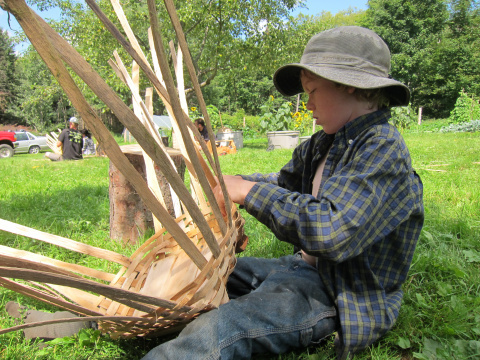
A boy and a basket
Down the field this early morning I moved the cows and meat birds under a dimming moon. The moon was full or nearly so, fading by the minute under the pressure of daybreak. I was dressed in long sleeves and happy for it – there’s been a hint of fall in the air recently, a certain urgent chill and slanted light at the fringes of the day. It’s been an idyllic summer, weather-wise – long, sweet stretches of sun and warmth interrupted by rain only a day or two before our feet start kicking up dust as we make our rounds.
The pack basket workshop exceeded all expectations. Or all of my expectations, anyway. To transform a simple log into something of such function and beauty using only the most basic of tools is something everyone should get to experience, if only because it dents the false logic of so many tenets upon which the modern market economy is built. Convenience. Expedience. Reliance on industry. Our dwindled human capabilities for labor and craft.
I think that’s what I like most about gatherings like the one this weekend: Like the beaver hide tanning workshop Nate led this winter, and like the fiber dyeing workshop Prin is facilitating next month, and like the many more skill-share gatherings we hope to host over the coming months and years, it was an embrace of the sort of self-determined logic that allows one to prosper on equally self-directed terms.
That, and as Nate wrote in his original workshop description, wearing a pack basket is a reminder that life is in fact not the least bit boring.
• • •
One of the things I’d like to improve about this space is my responsiveness to questions. Truth is, I have a finite amount of time I can devote to writing here, so it often feels like a choice between answering specific questions or incessant rambling on whatever strikes my fancy. For some reason, I seem to keep choosing the latter. There’s also the issue that I actually can’t answer many of the questions without guidance: Penny is the reservoir for much of our collective wisdom regarding cultivation specifics, so answering these questions generally means that first I have to push away from my desk, tromp downstairs, stumble across the boys’ detritus to the front door, fling it open, scream “Peeeennnnyyy!”, follow the sound of her return shriek from down the field or deep in the woods or wherever the hell she’s shrieking from, pose the question, saunter back to the house, stumble back across the (muddy/sharp/explosive) detritus, hump myself back up the stairs, settle into my desk chair, and try to remember what my wife told me.
Ok. So it’s not always that complicated. But you get the gist of it.
(And, rather ironically, here I am having wasted approximately as much time writing about how I don’t have enough time to answer questions as it would’ve taken me to answer a few of the said questions)
Anyway. I’m gonna work on it. There’s a bit of a backlog (kimchi recipe, insect/pest issues, and probably some others I don’t recall at the moment) but for the time being, I’m intrigued by this one: Does your family have tricks to fitting in all the food processing with cheery smiles?
I like this question because I think it hints at one of the primary stumbling blocks to a life of decreased dependence on industry (I almost wrote “a life of self-reliance,” but I believe self-reliance is a flawed ideology, so I didn’t): Namely, that the work essential to this decreased dependence on industry often feels overwhelming.
There is a large number number of excellent resources teaching the “hard skills” of growing and processing food and other essentials. In part because of this, learning these skills is the easy part. For me, at least, the much more difficult aspect is developing the “soft skills” that enable me to apply the hard skills effectively. I’ve written of this before, though I can’t remember exactly when. But the thesis was – as it remains – that simply maintaining my sense of equanimity in the face of the occasional overwhelming nature of our little holding is a far greater asset than the actual skills themselves.
To an extent, these things go hand-in-hand, because as one becomes more skilled and experienced, tasks that once overwhelmed become almost routine. To put this in the context of the question at hand (remaining cheery during food processing, if you’ve forgotten in the intervening ramble), I think of tasks like processing pigs or putting up our annual 60-quart stash of kimchi. Both these tasks were, at one point, daunting to us. But through repetition, both have become routine. No, that’s not quite right. Not quite routine. More like ritualistic, but in a way that demands little forethought, the preparation and motions having been honed by years and years of practice.
Here’s the thing, though: No matter how much we know and learn, no matter how many skills we acquire, there are always more on the horizon. And our ability to continue acquiring these skills and the knowledge and experience they contain is dependent on us maintaining that sense of equanimity. Otherwise, we’d always be too overwhelmed to even consider tackling something new.
To bring this ‘round to the specific question yet again: I think the best trick we have to fitting in all the processing with cheery smiles is to simply keep smiling. To remember that we are four of the luckiest people walking this great, beautiful, spinning orb. To not lose sight of the fact that being able to live in accordance with the self-determined logic I spoke of earlier is no small thing and is worth almost whatever it takes. Maybe you could even scratch the “almost.” Finally, to remember that all of this tasks are just like wearing a pack basket: A reminder that life is in fact not the least bit boring.
Oh, and you know what else works real good, especially with kids? Pea shelling races.

August 10, 2014
Badassketry
A lot of black ash pack baskets got made this weekend. It was good because making things is good and making things with good people is even gooder. I think I might like to do it a bit more often.
Pounding splints. If I had tats on my biceps like Greg, maybe I’d be strong enough to wield the hammer
Erin laying out her uprights
A teachable moment: Lucian politely critiquing my work
Baskets soaking in the pond during lunch
Nate teaching hard. Not only does he dress in buckskin clothing he made himself, he is a phenomenal teacher
Badassketry!

August 7, 2014
Too Much, Too Little
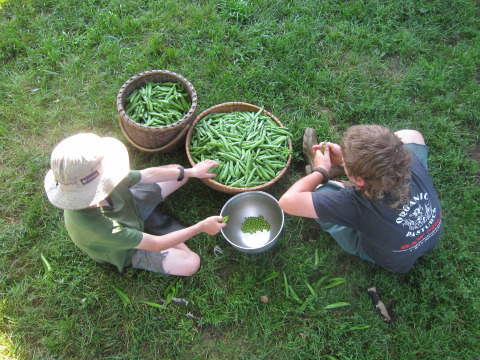
“You’ll get yer supper when all them peas are shelled, dammit!”
I want to clarify something in yesterday’s post that contradicts some of my prior blather. Yesterday, I wrote that we produce a surplus of almost all our food stuffs, whilst in the past I’ve waxed ad nauseam-poetic about how perfectly delightful it is to run out of certain things, if only for the blossoming joy and gratitude of their sweet return as small winged angels (is winged angels an oxymoron? I think so…) pluck harps of gold. Or some gushy shite like that.
Truth is, both are correct. We do produce a surplus of almost all our food stuffs and we do run out of many items on a regular basis, even those which we produce in excess. Now, I know what yer thinking: The dude’s a confessed high school dropout and furthermore admits to knowing all the lyrics to Holy Diver. He ain’t exactly the swiftest piglet in the litter. Alas, such is true. But it’s also true that I mean what I say. Surplus and shortage. Of the very same items.
How can it be so? It can be so because we do not expect to have access to everything we produce on a full-time, year-round basis. In part, this is because we simply can’t store many of our crops long enough to ensure a constant supply. For instance, whatever potatoes remain generally start going soft sometime in late April. Ditto onions and other root crops. Garlic. And so on. In other cases, we actually plan for an annual break precisely because of all those gushy reasons above. For instance, although we put up 100 or more quarts of blueberries, we generally run dry in spring or early summer. Truth is, we could put up even more berries. We could ensure perpetual face-stuffing. Easy-peasy.
But as I’ve mentioned before, if we never ran out, what fun would it be to watch the season’s first berries ripening on the vine, checking them every morning when I saunter down the field to move the cows to their day paddock? What fun would it be to carry the first handful back to the house in my grubby, calloused palm and split them amongst the four of us (minus the other handful I greedily scarfed right there, in the patch) ? What fun would it be to roll those little orbs around in our mouths for a minute, sucking the blue sweetness right out of them, heads tilted just a bit. the better to hear those angel-plucked harps? Why, listen, son: I think they’re playing our song!
So instead, once we have our 100 or so quarts put up and once we’ve had our fill of fresh berries and picking the skins out of one another’s teeth and listening to the angels, we open our patch to a handful of friends for you-pick. We get a little mad money and we get to run out of berries. It’s a win-win, really.
Of course, there are certain foods we try to never run short of, simply because they’re too fundamental to our day-in, day-out gustatory habits. Butter, sausage, and eggs come to mind. Kimchi or some sort of fermented vegetable (yo, Doug, I’ll post our recipe soon!). And we always, always have meat in the freezer, be it piggie, sheepie, cowsie, or one variety of poultry or another. This is maybe stating the obvious, but those adhering to plant-based diets don’t last too ’round these parts.
Anyway. Surplus and shortage. Too much, too little. It’s worth planning for both.

August 6, 2014
I Can Taste it Already

“Do I have anything in my teeth?”
As I’ve mentioned a few times, we eat real simple. Not a lot of fuss. This morning, crustless quiche leftover from dinner with friends. For lunch, it’ll be roast chicken, salad, and beets. The chicken is thawing on the counter. I’ll snatch the beets and salad out of the garden around 11:00. Dinner will be leftover chicken and more veggies. Today is actually a day of relatively fancy meals, since we had the quiche and since Penny’s mom will be here for lunch and dinner and she deserves a little extra lovin’ care.
We work really hard to not get so caught up in the business of growing and processing our food that we don’t get to actually eat it. It sounds pretty obvious, but I see it all the time: Folks get so busy with the growing and prep that they end up eating boughten food during the high seasons of spring, summer, and early fall. This seem to be particularly true of people growing for market. In my view, if you’re gonna go to the trouble of raising up all this really good chow, you might as well get to enjoy it.
That goes a long way to explain why we eat so simple. We just don’t have the time to do a lot of fancy cooking. We also tend to eat hyper-seasonally, because whatever food we eat directly off the land is food we don’t have to process. People think growing food is the hard part. Nope. It’s the processing that’s hard. I mean, it’s not that hard, but it is a significant portion of the work load. I think that sneaks up on a lot of people. Surprises them. Truth is, you gotta plan for processing the same way you plan for growing and harvesting.
This time of year, we’re eating blueberries like crazy. Every time we go out in public, Penny and I try to remember to pick the inevitable flecks of blueberry skin from between each other’s teeth, like a couple of chimps grooming one another. We might eat blueberries in some form or another for breakfast, lunch, and dinner. Of course, we eat a lot of fresh vegetables in the summer. Right now, we’re starting to snitch potatoes. We just processed those pigs, so there’s a lot of sausage around. We save the roasts and whatnot for winter. Dairy. Some nights we have milk for dinner. Doesn’t sound like much, but our cows make some seriously rich milk. It’s actually pretty satisfying.

Fin making dinner
Matron had a good post recently about planning for abundance. She’s spot on. We plan for abundance the way a business person plans for profit. It’s rare that we don’t have at least some surplus of pretty much every crop we grow. Generally, we barter or sell this surplus. Depending on what it is, we might feed it to the pigs. That’s one of the beauties of pigs. They eat it all. Or most of it, anyway: I’ve found they’re not too hot on three-year-old kimchi.
One of the “challenges” we have this time of year is just keeping up with harvesting everything. This is especially true as our plantings become more diversified; for instance, over the past couple of weeks, we’ve been harvesting blueberries, mulberries, currants (red and white), jostaberries, and raspberries. Pretty soon we’ll be into the wild blackberries. Of course, there’s all the garden stuff: We shelled and froze 40 pints of peas. We’ve lacto-fermented maybe 30 quarts of green beans. The garlic is harvested and hanging. And we’re drying chanterelles almost continuously; this is a crazy mushroom year. I’ve been making butter, though there’s not a chance in hell I’m gonna hit 200-lbs this year. Oh well. And so on. In general, we eat a lot of crops that don’t take an undue amount of effort and time to process. Carrots, onions, ‘taters, kimchi, garlic, winter squash, beets, berries. Those damnable shell peas are an exception. Butter is an exception because butter is exceptional. Sausage for the same reason.

Dry curing sausage. Almost ready
We are advantaged in that we’ve been doing this long enough that we no longer have to think about how much to grow. We have three very large gardens, in addition to the numerous perennial plantings. Each of the gardens is roughly the same layout, with all rows roughly the same length. That way, we can rotate crops and know that three rows of green beans in one garden is the same as three rows of green beans in another. We’re not big on fancy garden designs; we like straight, wide rows. We like squares and rectangles. We like organization. This is not hobby gardening. This is our food. As in, all of it. Or close enough. That’s not to say we don’t like pretty stuff or stuff we fancy just because. But we generally save it for the orchard-y areas.
Once fall and winter come, we’ll spend a bit more time in the kitchen. I’ll make fried chicken in lard a few times. Penny’ll make sourdough donuts a time or two. We’ll thaw the beef, pork, and chicken livers and make a passel of pate. We’ll do up some pork shoulder roasts in a reduction of fresh-pressed apple cider. Pizza. We’ll make us some pizza with our own chèvre, sausage, sun-dried tomatoes and chanterelles on top.
Damn. I can taste it already.

August 4, 2014
More Fun
Our friend Prin, a master (masteress?) of fiber arts, is leading a natural dyeing workshop at our place in September. Details below!

Point of Connection
I was thinking a bit about the reactions to the excerpt from Marshall Washer. It’s funny, but I never really considered that anyone would find it depressing or a downer. I think that’s because when I read that passage, I hear the language, not the words, if that makes any sense, and I think the language is something to behold. I also think it’s because when I read about Marshall, I have in my mind very particular images of specific people I know. People I respect and admire.
In 1947, there were 11,206 dairy farms in Vermont. Now, there are 992, making even more milk than all those 11,000 combined. I believe Carruth wrote that poem sometime in the early 70’s, when Vermont had about 5,000 dairy farms left. You can see how he might’ve viewed Marshall’s farm as being doomed, but the truth is he didn’t know the half of it, because between then and now, another 4,000 or more Marshalls have hung up their milking machines. Those empty barns are everywhere, leaning into the ground.
Will says it’s only the farmer who’s doomable, not the farm. Maybe he’s right. I don’t know. Maybe every generation or two has its version of farming and Marshall just had the misfortune of getting caught between generations. Around here, there is undoubtably an increase in a certain type of farming. The value-added artisan producers are making money. They’re doing well. Expanding. And there are still a few small dairies making a go of it. But man. The work. I’m close enough to it to know what it takes, and it takes a lot. A whole lot.
There’s another reason I think that passage isn’t depressing to me. That’s because it speaks of a man who knows his knowledge is useless but holds onto it anyway. Cultivates it, even. Because of course it’s not actually useless; it is only useless to those who define it as useless, who do not understand or care how it fits into all the small folds of Marshall’s life. I bet Marshall knew all this, even if he never spoke it, though of course I can’t know for certain. I didn’t know Marshall. I only know people who remind me of him, or at least the version of him I know from the poem.
It’s funny, but when I chose those images of Rye working the cow hide I wasn’t thinking of how they related to the poem. Not consciously, anyway. But I see it now. Fleshing a hide. Stretching it. Drying it. Scraping it. Working it. And for what? To make cow hide sandals in a world of Nikes?
But here’s the thing, and Carruth mentions it right there in that excerpt, albeit in a different context. But to live on a doomed farm is worse. It must be worse. There the exact point of connection, gate of conversion, is – mind and life.
In other words, the thing that makes it worse – that point of connection, gate of conversion – is the very thing that makes it worth everything to begin with.
Another excerpt from the poem:
He sows
his millet broadcast, swinging left to right,
a half-acre for the cows’ “fall tonic” before
they go in the barn for good; an easy motion,
slow swinging, a slow dance in the field, and just
the opposite, right to left, for the scythe
or the brush-hook. Yes, I have seen such dancing
by a man alone in the slant of the afternoon.
At his anvil with his big smith’s hammer
he can pound shape back in a wagon iron, or tap
a butternut so it just lies open. When he skids
a pine log out of the woods he stands in front
of his horse and hollers, “Gee-up, goddamn it,”
“Back, you ornery son-of-a-bitch,” and then
when the chain rattles loose and the log settles
on the stage, he slicks down the horse’s sweaty
neck and pulls its ears. In October he eases
the potatoes out of the ground in their rows,
gentle with the potato-hook, then leans and takes
a big one in his hand, and rubs it clean
with his thumbs, and smells it, and looks
along the new-turned frosty earth to fields,
to hills, to the mountain, forests in their color
each fall no less awesome.

August 1, 2014
Every Useful thing
No doubt
Marshall’s sorrow is the same as human
sorrow generally, but there is this
difference. To live in a doomed city, a doomed
nation, a doomed world is desolating, and we all
are desolate. But to live on a doomed farm
is worse. It must be worse. There the exact
point of connection, gate of conversion, is -
mind and life. The hilltop farms are going.
Bottomland farms, mechanized, are all that survive.
As more and more developers take over
northern Vermont, values of land increase,
taxes increase, farming is an obsolete vocation -
while half the world goes hungry. Marshall walks
his fields and woods, knowing every useful thing
about them, and knowing his knowledge is useless.
from Hayden Carruth’s poem Marshall Washer. It’s a good one. You can read the rest of it in this book.

Ben Hewitt's Blog
- Ben Hewitt's profile
- 37 followers




